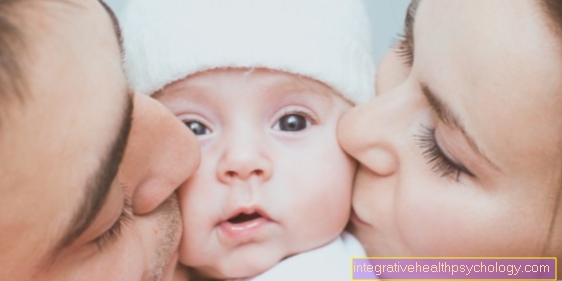Treatment of cold sores
introduction
The treatment of fever blisters should be started as early as possible, preferably before the actual blister has formed. This can lessen the herpes outbreak and relieve the pain.
The treatment is primarily aimed at the symptoms that are caused by a fever blister, as there is currently no way to completely remove the herpes viruses from the body. A cold sore heals by itself after about a week and treatment is not absolutely necessary. To alleviate the symptoms and to accelerate healing, however, it is advisable to treat the vesicle with medication. There are a wide variety of medicines for cold sores that can be purchased over the counter at any pharmacy. As a rule, those affected can treat themselves and do not have to see a doctor.
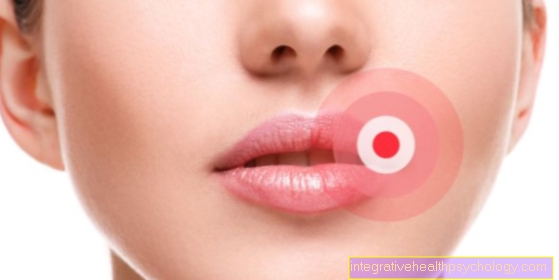
What treatment options are there?
There are various treatment options available for cold sores. The most common are ointments or creams that contain so-called antivirals. These are active ingredients that prevent the herpes viruses from multiplying and spreading further in the body. Common antivirals that are often used for cold sores include acyclovir, ganciclovir or penciclovir. When used in time, these drugs ensure that the course of the cold sore is weakened and the cold sore heals faster. In order to stop the virus from multiplying as early as possible, a fever blister should be treated at the first signs, such as burning or tingling on the lips. It is very rarely possible for a cold sore to become severe. In such cases, the antiviral must then be administered via an infusion over several days.
Pain relievers such as ibuprofen can also be taken. Disinfecting ointments also support the healing process. There are currently no substances that kill the viruses (so-called virucides). For this reason, the herpes virus cannot be eliminated from infected people, and those affected often suffer from recurrent outbreaks of cold sores. Zinc ointment can also be used to promote the healing and drying of the blister.
Also read:
- Symptoms of herpes
Should you prick a cold sore?
Many people mistakenly believe that pricking open cold sores will heal faster. This is wrong!
Pricking the lip relieves the tension, but the fluid contained in the blisters contains a large number of herpesviruses capable of multiplying and is therefore extremely infectious. Pricking the infection can spread to the skin and hands and thus reach other areas of the body. Other people can become infected much more easily and also develop a cold sore.
There is another reason why you should absolutely refrain from piercing the annoying vesicles: By piercing, bacteria and germs can get into the wound and lead to further infection of the bladder. As a result, it will take longer for the cold sore to heal. Often unsightly scars remain on the lip. In the worst case, invading bacteria can be carried into the bloodstream and lead to serious complications such as a brain abscess or blood poisoning and multi-organ failure.
- Proper cold sore treatment
- Ocular herpes
- Herpes simplex encephalitis
These drugs are used
The most common medications for cold sores are ointments orCreams with antiviral active ingredients (antivirals). Proven drugs that are preferred for cold sores are acyclovir and penciclovir. These are so-called nucleoside analogs. The mechanism of action of these antivirals is that they intervene directly in the viral replication mechanisms, namely in DNA replication, and interrupt them. This also explains why drugs against cold sores must be used as early as possible: Antivirals only inhibit the multiplication of viruses in the patient's body, but do not kill them. An early use of the medication keeps the viral load low and prevents the formation of the fever blister or accelerates the crust formation and the healing process.
Clinical studies have shown that acyclovir and penciclovir are very well tolerated. Both drugs can be used both at the first signs of a fever blister and in later stages. Another active ingredient against cold sores is foscarnet sodium. In contrast to the two drugs mentioned above, however, this is a prescription drug. In the early stages of cold sores, treatment with creams containing tromantadine, which also contain a virostat as an active ingredient, is also possible.
In the case of severe courses, which occur very rarely, the doctor prescribes systemic therapy with antivirals. This means that the antiviral active ingredients, such as acyclovir or valaciclovir, are administered via an infusion and thus achieve higher effective concentrations in the body.
More information on this topic:
- Cold sore creams
Fever blister cream
Cold sores are usually treated with cold sore creams or gels. At the first signs of a cold sore, those affected should apply a cold sore cream to the itchy or burning area. Prompt treatment can stop the herpes virus from spreading and reduce accompanying symptoms such as pain and tightness of the lips.
Fever blister creams can be bought without a prescription in any pharmacy and there is now a large selection of different products and manufacturers. Most of the products have in common that they contain antivirals as an active ingredient. The creams can be applied directly to the fever blister or the itchy area. You should make sure to apply the cream thinly and repeat this process 2-4 times a day as needed. The symptoms usually improve after just a few days and the fever blister should have healed completely and the crust should have fallen off after 10 days at the latest. If this is not the case or if the symptoms worsen, a doctor should be consulted and further treatment should be discussed with him. The use of a cold sore cream accelerates healing significantly and is recommended in most cases.
Read more about this:
- Fever blister ointment
Home remedies
An effective home remedy that can be used for cold sores is zinc ointment. This cream has an antibacterial effect and removes moisture from the skin, which is why the blisters dry out and heal faster. Ointments containing lemon balm extract have also proven effective in the treatment of cold sores. Cold sores can also be treated with lysine. Lysine is an amino acid, a component of protein, that is known to prevent cold sores from breaking out. Lysine can either be taken directly as a supplement or through food. It is found naturally in many foods, such as red meat, fish and eggs.
Many people also swear by toothpaste or vinegar, but caution is advised with these home remedies. The agents act very aggressively on the skin and dry it out, which can lead to further irritation of the affected skin area and an additional bacterial infection of the fever blister.
Finally, it should not be underestimated that a strong immune system is the most effective prophylaxis against cold sores, as a weakened immune system is often associated with the outbreak of herpes viruses. Lots of exercise in the fresh air and a balanced diet promote health and strengthen well-being.
Also read:
- Home remedies for cold sores
- Home remedies for herpes
- Zinc ointment
homeopathy
There are a number of homeopathic globules that can be used for cold sores. These include sepia, sodium muriaticum, Rhus toxicodendron and phosphorus. Many people use homeopathy for cold sores, but it should be remembered that only drugs with antiviral agents are able to stop the virus from multiplying and prevent the infection from spreading.
How are babies and toddlers treated?
Whereas cold sores are not a problem in adults and usually heal without therapy, cold sores in babies and young children should be treated immediately. The herpes viruses can be very dangerous for children, as the immune system of the little ones is not yet fully developed and the viruses cannot be fought adequately. The younger the child, the more dangerous it is to be infected with the herpes simplex virus. Especially in the first few weeks of life there is a risk that the viruses will spread throughout the baby's body and infect the brain and internal organs.
The typical cold sores on the lip usually only develop in older children from the age of five or six. In newborns and small children, the infection usually manifests itself in the form of oral rot after initial contact with the herpes virus. This is a painful, vesicular rash in the oral cavity. The children can sometimes have a high fever, refuse to eat or drink and suffer from bad breath. Due to the reduced drinking behavior, there is a risk that the child will dry out (dehydrated), which is why parents must ensure that the child still consumes sufficient fluids. If a herpes infection is suspected, the child should definitely be presented to a pediatrician who will prescribe drugs with antiviral agents.
To protect their children from contracting the virus, parents with cold sores should adhere to strict hygiene measures. The children should not be kissed under any circumstances and hands must be washed thoroughly before body contact.
Important information about this:
- Herpes in babies - how dangerous is it?
- Mouth rot in the baby
- This is how contagious cold sores are

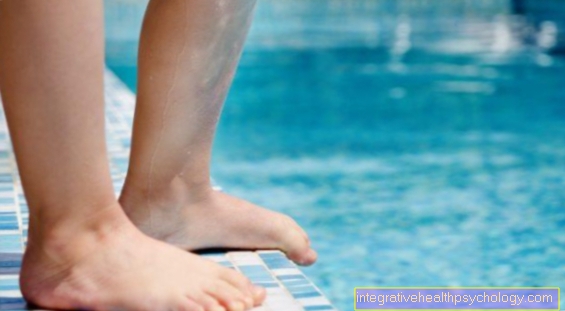

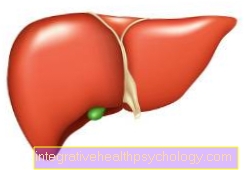



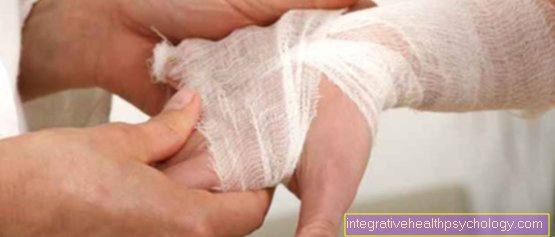
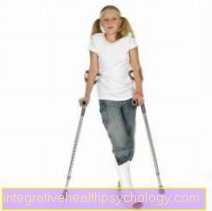



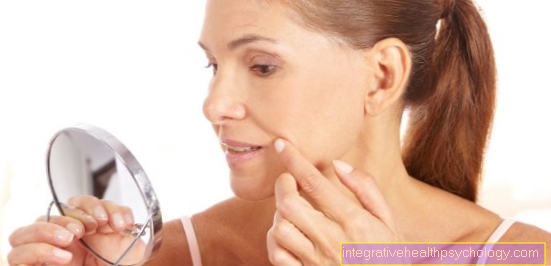
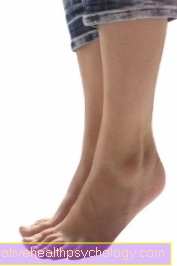


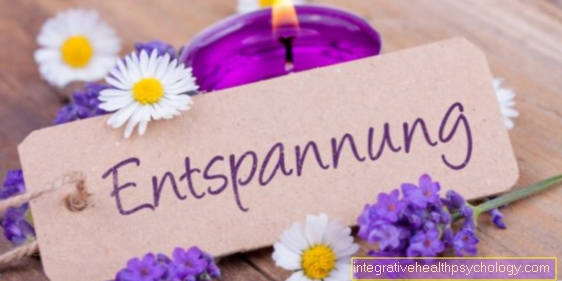



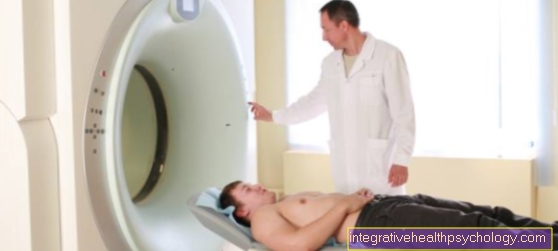
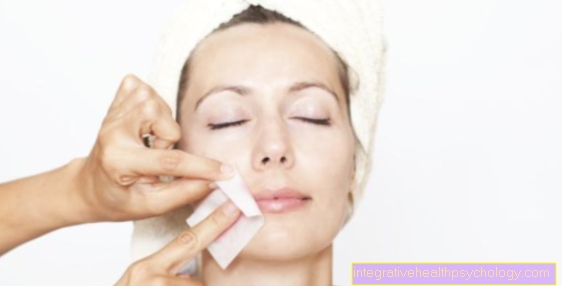
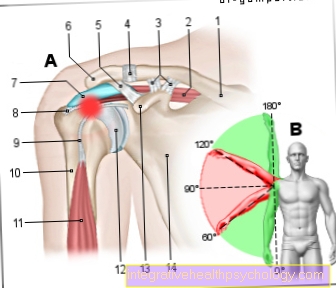
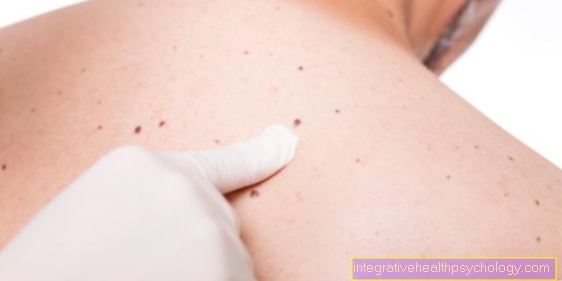
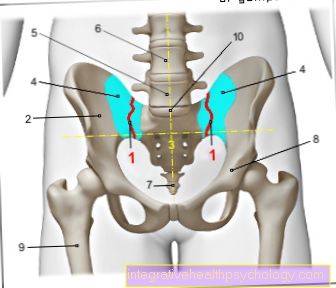
.jpg)



